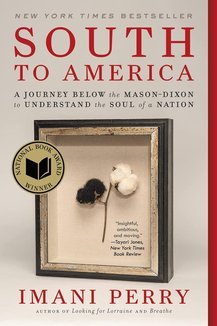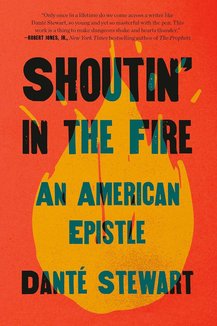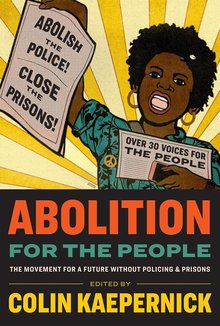Recommended Books

South to America: A Journey Below the Mason-Dixon to Understand the Soul of a Nation
Author:
Imani Perry
ISBN 13:
978-0062977373
WINNER OF THE 2022 NATIONAL BOOK AWARD FOR NONFICTION INSTANT NEW YORK TIMES BESTSELLER “An elegant meditation on the complexities of the American South—and thus of America—by an esteemed daughter of the South and one of the great intellectuals of our time. An inspiration.” —Isabel Wilkerson An essential, surprising journey through the history, rituals, and landscapes of the American South—and a revelatory argument for why you must understand the South in order to understand America We all think we know the South. Even those who have never lived there can rattle off a list of signifiers: the Civil War, Gone with the Wind , the Ku Klux Klan, plantations, football, Jim Crow, slavery. But the idiosyncrasies, dispositions, and habits of the region are stranger and more complex than much of the country tends to acknowledge. In South to America , Imani Perry shows that the meaning of American is inextricably linked with the South, and that our understanding of its history and culture is the key to understanding the nation as a whole. This is the story of a Black woman and native Alabaman returning to the region she has always called home and considering it with fresh eyes. Her journey is full of detours, deep dives, and surprising encounters with places and people. She renders Southerners from all walks of life with sensitivity and honesty, sharing her thoughts about a troubling history and the ritual humiliations and joys that characterize so much of Southern life. Weaving together stories of immigrant communities, contemporary artists, exploitative opportunists, enslaved peoples, unsung heroes, her own ancestors, and her lived experiences, Imani Perry crafts a tapestry unlike any other. With uncommon insight and breathtaking clarity, South to America offers an assertion that if we want to build a more humane future for the United States, we must center our concern below the Mason-Dixon Line. A Recommended Read from: The New Yorker • The New York Times • TIME • Oprah Daily • USA Today • Vulture • Essence • Esquire • W Magazine • Atlanta Journal-Constitution • PopSugar • Book Riot • Chicago Review of Books • Electric Literature • Lit Hub

Shoutin' in the Fire: An American Epistle
Author:
Danté Stewart
ISBN 13:
978-0593239629
A stirring meditation of being Black and learning to love in a loveless, anti-Black world “Only once in a lifetime do we come across a writer like Danté Stewart, so young and yet so masterful with the pen. This work is a thing to make dungeons shake and hearts thunder.”—Robert Jones, Jr., New York Times bestselling author of The Prophets In Shoutin’ in the Fire, Danté Stewart gives breathtaking language to his reckoning with the legacy of white supremacy—both the kind that hangs over our country and the kind that is internalized on a molecular level. Stewart uses his personal experiences as a vehicle to reclaim and reimagine spiritual virtues like rage, resilience, and remembrance—and explores how these virtues might function as a work of love against an unjust, unloving world. In 2016, Stewart was a rising leader at the predominantly white evangelical church he and his family were attending in Augusta, Georgia. Like many young church leaders, Stewart was thrilled at the prospect of growing his voice and influence within the community, and he was excited to break barriers as the church’s first Black preacher. But when Donald Trump began his campaign, so began the unearthing. Stewart started overhearing talk in the pews—comments ranging from microaggressions to outright hostility toward Black Americans. As this violence began to reveal itself en masse, Stewart quickly found himself isolated amid a people unraveled; this community of faith became the place where he and his family now found themselves most alone. This set Stewart on a journey—first out of the white church and then into a liberating pursuit of faith—by looking to the wisdom of the saints that have come before, including James H. Cone, James Baldwin, and Toni Morrison, and by heeding the paradoxical humility of Jesus himself. This sharply observed journey is an intimate meditation on coming of age in a time of terror. Stewart reveals the profound faith he discovered even after experiencing the violence of the American church: a faith that loves Blackness; speaks truth to pain and trauma; and pursues a truer, realer kind of love than the kind we’re taught, a love that sets us free.

Abolition for the People: The Movement for a Future without Policing & Prisons
Author:
Colin Kaepernick
ISBN 13:
978-1595911162
Edited by activist and former San Francisco 49ers super bowl quarterback Colin Kaepernick, Abolition for the People is a manifesto calling for a world beyond prisons and policing. Abolition for the People brings together thirty essays representing a diversity of voices―political prisoners, grassroots organizers, scholars, and relatives of those killed by the anti-Black terrorism of policing and prisons. This collection presents readers with a moral choice: “Will you continue to be actively complicit in the perpetuation of these systems,” Kaepernick asks in his introduction, “or will you take action to dismantle them for the benefit of a just future?” Powered by courageous hope and imagination, Abolition for the People provides a blueprint and vision for creating an abolitionist future where communities can be safe, valued, and truly free. “Another world is possible,” Kaepernick writes, “a world grounded in love, justice, and accountability, a world grounded in safety and good health, a world grounded in meeting the needs of the people.” The complexity of abolitionist concepts and the enormity of the task at hand can be overwhelming. To help readers on their journey toward a greater understanding, each essay in the collection is followed by a reader’s guide that offers further provocations on the subject. Newcomers to these ideas might ask: Is the abolition of the prison industrial complex too drastic? Can we really get rid of prisons and policing altogether? As writes organizer and New York Times bestselling author Mariame Kaba, “The short answer: We can. We must. We are.” Abolition for the People begins by uncovering the lethal anti-Black histories of policing and incarceration in the United States. Juxtaposing today’s moment with 19th-century movements for the abolition of slavery, freedom fighter Angela Y. Davis writes “Just as we hear calls today for a more humane policing, people then called for a more humane slavery.” Drawing on decades of scholarship and personal experience, each author deftly refutes the notion that police and prisons can be made fairer and more humane through piecemeal reformation. As Derecka Purnell argues, “reforms do not make the criminal legal system more just, but obscure its violence more efficiently.” Blending rigorous analysis with first-person narratives, Abolition for the People definitively makes the case that the only political future worth building is one without and beyond police and prisons. You won’t find all the answers here, but you will find the right questions--questions that open up radical possibilities for a future where all communities can thrive.